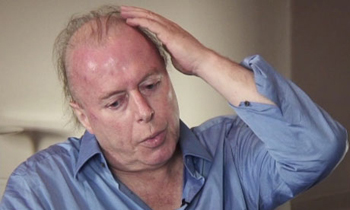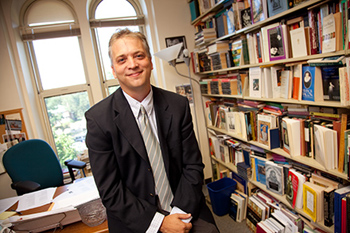For Sunday February 14, 2016
First Sunday in Lent
Lectionary Readings (Revised Common Lectionary, Year C)
Deuteronomy 26:1–11
Psalm 91:1–2, 9–16
Romans 10:8b–13
Luke 4:1–13
This week presents an interesting quirk of the calendar for believers. In between the hype of Super Bowl Sunday on February 7, and the sentimentality of Valentines Day on Sunday February 14, we begin the season of Lent on Ash Wednesday.
Since the fourth century, Christians have observed the 40 week days before Easter as a period of reflection, repentance, fasting, abstinence, and acts of mercy. In particular, we're invited to remember that some day we will die.
Lent isn't an end in itself. It's not some sort of world-denying moralism. Rather, it's the enactment of a spiritual paradox and our confession of a greater end — that to live life fully in the here and now, we embrace our mortality. And that our hope in Easter resurrection passes through the certainty of our physical death.
Lenten practices like abstaining from alcohol don't mean that Christians are a bunch of killjoys. Far from it. In fact, the very opposite is closer to the truth. During Lent we shed the superficialities of our lives in order to drill down and "take hold of the life that is truly life indeed" (1 Timothy 6:19). We're seeking the "abundant life" that Jesus said he came to give everyone, a spiritual life that transcends material existence (John 10:10).
 |
|
Christopher Hitchens (1949-2011).
|
To "remember death" has always been standard pastoral wisdom in the church. In his famous "Rule," St. Benedict advised his monks to "see death before one daily." In the fifteenth century, a whole genre of literature emerged on "The Art of Dying." These manuals advised readers how to die well, and clergy on how to help them do that.
In our broader culture, our best thinkers acknowledge that wrestling with death is a strategy for life. This week I read a survey of end-of-life memoirs by Tom Rachman, "Meeting Death with Words," in the online New Yorker (January 25, 2016). I've reviewed a number of the books that he mentions—by Sinan Antoon, Julian Barnes, Joan Didion, Atul Gawande, Christopher Hitchens, and Andrew Meredith.
Last month I read Caitlin Doughty's memoir called Smoke Gets In Your Eyes and Other Lessons from the Crematory (2014). Our culture denies death, she argues. Unlike a hundred years ago when people died at home and every family dealt with death up close and personal, today we have medicalized death and outsourced it to professionals.
Doughty wants to "look mortality straight in the eye." In her view, "death should be known. Known as a difficult mental, physical, and emotional process, respected and feared for what it is."
"Knowing" death carries an entirely positive purpose: "When you know that death is coming for you, the thought inspires you to be ambitious, to apologize to old enemies, call your grandparents, work less, travel more, learn Russian, take up knitting. Fall in love." Doughty is irreligious, but she sounds very Lenten.
Similarly, in his book Being Mortal, Gawande observes how elderly people who are more mindful of mortality often shift their life priorities to being rather than doing, to giving rather than getting, to friendships rather than accomplishments, to family rather than work, and so on.
 |
|
Paul Kalanithi (1977-2015).
|
This is why Lent is so beautiful and so powerful. Ash Wednesday is that "most honest of days," says Sara Miles, because it's a day when the church reminds us of what our culture denies — that our days are limited, and that we've made a mess of things. The hard truth of Lent is thus a blessing because it exposes what Gawande calls "the prevailing fantasy that we can be ageless."
On Ash Wednesday the priest smears ashes on my forehead to remind me of my mortality. To each and every parishioner he recites God's words to Adam, “for dust you are, and to dust you will return.” This somber truth stands in stark contrast to the archetypal lie that Satan told Eve, and the denial that flourishes down to our own day: "surely you will not die!"
And so the Lenten wisdom to "remember death" — memento mori. We remember death as a way to affirm life. Meditating on mortality helps me to live more fully in the present.
Last Saturday I read the brand new memoir by the Stanford neurosurgeon Paul Kalanithi, When Breath Becomes Air (2016). I couldn't put it down and finished it in a day.
Just when he had finished twelve years of medical training, at the age of thirty-six, Kalanithi was diagnosed with stage IV metastatic lung cancer—a terminal diagnosis that was extremely rare for someone his age (.0012% of the population).
His memoir describes how he and his wife Lucy, an internist at Stanford, struggled to find meaning in this dramatic reversal brought about by his imminent death — from being a superstar neurosurgeon who had won prestigious national awards to becoming a patient in a hospital gown sitting in the very same examine room where he had treated his own patients.
What makes Kalanithi's story so compelling is that he was always "driven less by achievement than by trying to understand, in earnest: What makes human life meaningful?" Like Doughty, he offers a very Lenten like piece of wisdom: "The fact of death is unsettling," he writes, "yet there is no other way to live."
 |
|
Brett Foster (1973-2015).
|
I love Lent. It reminds me that I don't need to be stuck in tired ways of thinking and acting. Renewal is possible. Change can happen. I can wipe the mud off my glasses. Hit the reset button. Consider what's really important for a good life. I don't need to wait for old age to magically impart a new perspective on what matters most and why. And because Ash Wednesday ends in Easter Sunday, believers are the ultimate optimists.
This Ash Wednesday I'm remembering my friend and poet Brett Foster. I was so happy when Brett visited me in my home last May, but also shocked to learn then that he was staring death in the face due to stage IV colon cancer. After he left I could barely speak. He died six months later at the age of forty-two.
After I return home on Ash Wednesday, and the cross on my forehead has turned to a smudge, I'll still hope for what Brett called "those hallowed moments / to be followed by sustaining confidence."
For further reflection:
Brett Foster (1973–2015)
Longing, Lenten
The walk back, more loss. When I open the door
it's over, so I set to piddling: tidy
end tables, check the mail, draw a bath.
The restless energy finally settles
as I pass the mirror. I peer into it.
My nose touches glass. Not much left,
already effaced, not even a cross
to speak of. A smudge. A few black soot stains
like pin points on the forehead. The rest
of the blessed ash has vanished to a grey
amorphousness, to symbolize… not much.
Except a wish for those hallowed moments
to be followed by sustaining confidence.
Except spirit, which means to shun its listless
weight for yearning, awkward if not more earnest
prayer and fasting in the clear face of dust.
Taken from Jay Hopler and Kimberly Johnson, editors, Before the Door of God; An Anthology of Devotional Poetry (New Haven: Yale University Press, 2013).
Image credits: (1) AgeOfTruth.dk; (2) MSNBC.com; and (3) Wheaton College.



